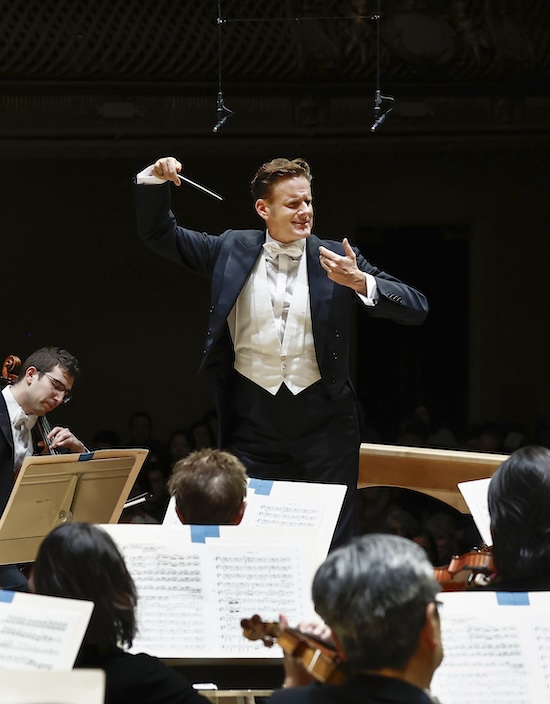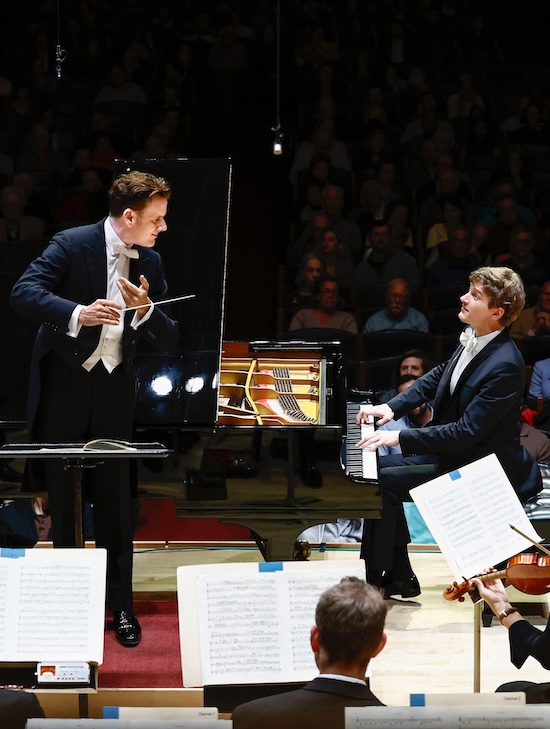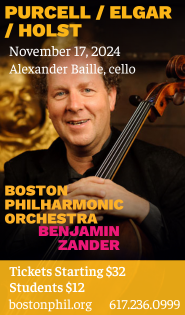An individual “Pathetique” and fresh Mozart from Jordan, Lisiecki and BSO

Philippe Jordan conducted the Boston Symphony Orchestra Thursday night in music of Mozart and Tchaikovsky. Photo: Winslow Townson
To live, Nietzsche tells us, is to suffer, and few 19th-century composers captured the essence of that sentiment more memorably than Piotr Ilyich Tchaikovsky. Yet the Russian master was much more than a passive victim of fate, as the Boston Symphony Orchestra’s Thursday-night performance of his Symphony No. 6 reminded.
Written in 1893 and premiered just nine days before the composer’s death, the so-called “Pathétique” symphony has, understandably, carried with it the whiff of the grave. Its tragic finale even helped give rise to a host of spurious conspiracy theories about how and why Tchaikovsky met his end.
But the music’s point isn’t the tomb. Tchaikovsky, himself, offered that the Symphony’s subject is life, though he didn’t provide an explicit program to accompany this claim.
No matter: getting that intent across is fundamentally the responsibility of the work’s interpreters and, on Thursday, the BSO had a fine paladin in Philippe Jordan. Back at Symphony Hall for the first time since his impressive debut in 2022, the music director of the Vienna State Opera found in the Sixth’s pages many instances of songful drama.
That wasn’t surprising. But how he managed to shape and frame those moments into a continuous, forty-five-minute-long argument was striking.
At the root of Jordan’s interpretation was a strong sense of musical direction allied with a keen ear for instrumental color and balances.
To wit, tempos always moved. Granted, they were sometimes a bit frantic. But while Thursday’s performance didn’t feature the most polished execution of the Sixth’s periodically skittish string writing, it compensated for this deficiency with sheer excitement.
To be sure, the first movement’s big, lyrical refrains soared; they sounded as impassioned as that section’s abrupt silences were charged with tension. Though some color and nuance was left untapped in the frenetic drive to the Allegro molto vivace’s denouement, its climactic theme snapped. What’s more, the BSO’s dovetailing of lines in the coda was thrilling; one could hear the trombones and tuba descend all the way to the bottom of their ranges at movement’s end.
Best of all was the finale, which surged with purpose and agency. As he’d also done in the lilting second movement, Jordan drew out a range of colors and dynamic shadings here. The results were captivating, culminating in a sobering rendition of the low brass chorale and a devastatingly effective low-string fadeout.
The night’s account of Mozart’s Piano Concerto No. 20 was similarly turbulent.
This 1785 score’s storminess held no terrors for Jan Lisiecki, who was making his first appearance with the BSO since 2019. Playing with crisp, pearly tone and a distinct grasp of Mozartian style, the Canadian virtuoso was firmly in his element. Though his take on the first movement was a shade measured, the Romanze and Rondo drove smartly.

Jan Lisiecki performed Mozart’s Piano Concerto No. 20 with Philippe Jordan and the BSO Thursday night. Photo: Winslow Townson
The former, in fact, was splendidly vital. Graceful and flowing, the movement unfolded as a true instrumental song, the fresh handiwork of a twenty-something composer with the world seemingly at his feet and a musical understanding that was wise beyond his years.
Also musically wise beyond his years is the 29-year-old Lisiecki, whose balance of the night’s technical and expressive elements never failed to impress: his command of articulations and voicings was, throughout the concerto, immaculate. While he kicked up an Apollonian tempest in its outer-movement cadenzas, the pianist rounded into exquisite, Romantic form with his encore of Chopin’s “Raindrop” Prelude (Op. 28, no. 15).
For his part, Jordan’s experience as an orchestral accompanist ensured that the night’s unabashedly modern-instrument approach to Mozart didn’t swamp the soloist. The conversational episodes between woodwinds and keyboard spoke sweetly and, overall, the reading offered plenty of zip and shapeliness.
Even so, the BSO’s string complement was conspicuously large. Consequently, when the ensemble endeavored to match Lisiecki’s essentially poetic elucidation of the score’s finer points (particularly in the outer movements), it tended to lumber.
The program will be repeated 1:30 p.m. Friday and 8 p.m. Saturday at Symphony Hall. bso.org
Posted in Performances



